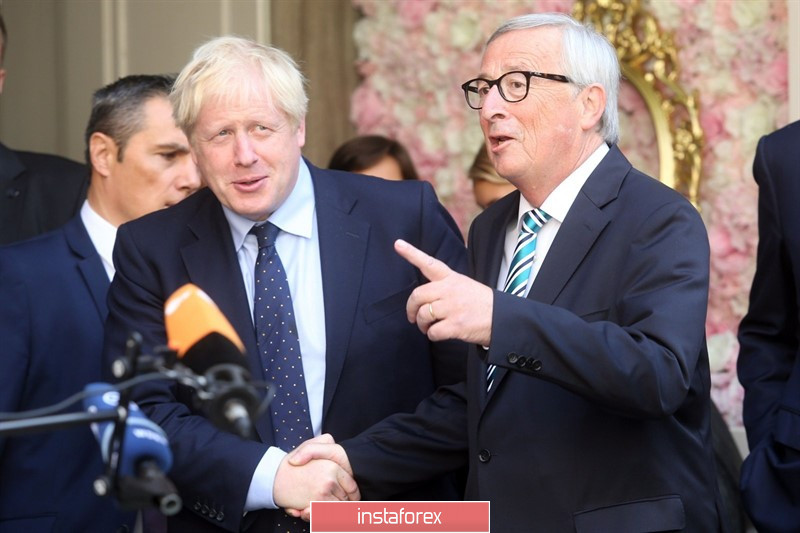
A weak report on retail sales in the US, heightened investor concerns about the resilience of the US economy to trade wars, as well as increased chances of a Brexit deal and a Federal Reserve rate cut in October, making it possible for EUR/USD bulls to storm support at 1.1065 and continue their attack towards 1.1100.
Consumer spending in the United States fell for the first time in seven months. At the same time, such a rate of decline has not been observed since February.
It is obvious that the US economy is losing steam, so the divergence in economic growth of the US and the rest of the world does not provide the dollar with the same support.
In addition, consumer spending is a pillar of the US economy, and the latest report may give the FOMC's "doves" a good reason to support a third federal funds rate cut.
If on Tuesday the derivatives market estimated the probability of easing the Fed's policy at the upcoming meeting at 72%, then on Wednesday this figure rose to 86%.
Meanwhile, the fall of European consumer prices to 0.8% in September (the lowest level in almost three years), apparently, does not bother the "hawks" of the ECB Governing Council. According to the President of the Bundesbank, Jens Weidmann, the Phillips curve is still working, and a 1% increase in average wages will accelerate inflation by 0.3%. Yes, this is a lengthy process, but it goes.
Meanwhile, the Fed began to acquire treasury bills. The volume of the first operation amounted to $7.5 billion, and proposals - $32.6 billion. Although Fed Chairman Jerome Powell noted that resuming asset purchases is not a new QE, the market seems to be of a different opinion. If the US Treasury increases the emission of short-term debt and reduces the release of long-term, this is unlikely to affect rates. However, if current plans remain unchanged, then profitability will decline across the entire spectrum of obligations. This is nothing more than monetary stimulation of the economy. Investors are well aware that its potential in the United States is wider than in Europe, so they continue to buy EUR/USD.
This week, the single European currency showed an upward trend, including due to the prospect of concluding a deal between London and Brussels under the Brexit conditions, which will reduce the degree of uncertainty and eliminate risks not only for the United Kingdom, but also for other members of the eurozone.
The deal should be announced in the coming days. This event may push EUR/USD to 1.1150 if the market considers the deal to be profitable. Although analysts predict further worsening macroeconomic statistics for the eurozone, optimism about Brexit and the prospects for the Fed to cut rates at the end of this month will be the main drivers of EUR/USD growth in the near future.
The British currency against the US dollar reached a five-month high, rising above $1.29 amid reports that the negotiators of the UK and the European Union agreed on the conditions for the country to leave the bloc before the decisive EU summit.
"We've got a great new deal", UK Prime Minister Boris Johnson tweeted.
He called on British lawmakers to support the deal when it is presented to the House of Commons on Saturday.

European Commission President Jean-Claude Juncker called the deal "fair and balanced."
"I recommend that the European Council approve this deal," he said.
Discussions on the development of a divorce agreement continued until late at night on Tuesday and Wednesday. It will be presented to EU leaders at their summit, which will be held in Brussels on October 17–18, and then to the British Parliament on October 19.
"The full adoption of the document in the next few days looks extremely ambitious, although theoretically possible. However, this scenario is still unlikely. This means that the Benn act will come into play this weekend, requiring another Johnson request to defer Brexit's date," according to TD Securities.
Although the euro, the pound and other major currencies were ahead of the dollar, the losses of the greenback against the yen were not so great.
The Japanese currency fell 1.18% over the week. At the moment, the USD/JPY pair is trading near the level of 108.7.
"The yen maintains the status of the cheapest of the major currencies," said Mark McCormack, chief currency strategist at TD Securities.
According to Karen Fishman, an economist at Goldman Sachs, the weakness of the yen is due to purchases of foreign assets by Japan's Government Pension Investment Fund (GPIF), which puts pressure on the national currency.
"GPIF's large-scale investment in foreign assets frees the Japanese government from the need for foreign exchange interventions that could provoke Donald Trump's anger with the urge to accuse countries of manipulating their currencies," she said.
M. McCormack believes that a fall in US stocks could cause a significant strengthening of the yen, since in this case Japanese investors will get rid of US assets and return their money to their homeland.
Such a scenario will force the Japanese government to intervene and weaken the national currency, the analyst said, who determined the "pain threshold" for USD/JPY quotes at 95.
 English
English 
 Русский
Русский Bahasa Indonesia
Bahasa Indonesia Bahasa Malay
Bahasa Malay ไทย
ไทย Español
Español Deutsch
Deutsch Български
Български Français
Français Tiếng Việt
Tiếng Việt 中文
中文 বাংলা
বাংলা हिन्दी
हिन्दी Čeština
Čeština Українська
Українська Română
Română

